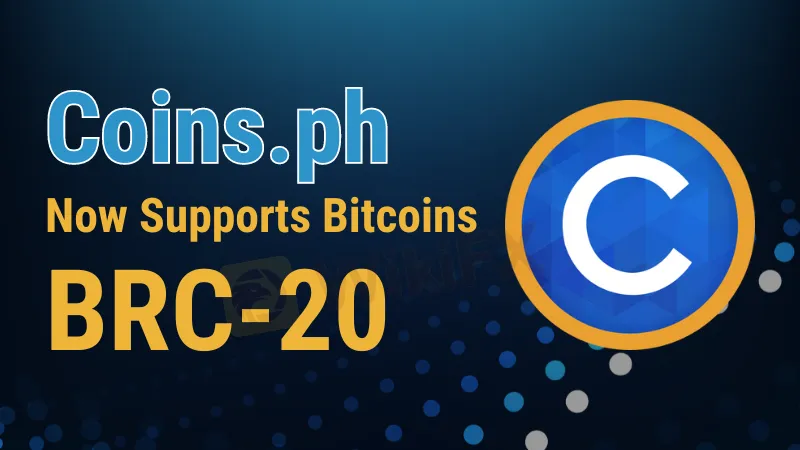简体中文
繁體中文
English
Pусский
日本語
ภาษาไทย
Tiếng Việt
Bahasa Indonesia
Español
हिन्दी
Filippiiniläinen
Français
Deutsch
Português
Türkçe
한국어
العربية
Coins.ph Now Supports Bitcoins BRC-20
Abstract:Coins.ph pioneers BRC-20 token support in the Philippines, enhancing crypto access and innovation in digital finance.

In the Philippines, in Manila, Coins.ph, a leading local cryptocurrency exchange, has introduced support for BRC-20 tokens, marking a significant development in the Philippine digital currency landscape. This groundbreaking action not only reinforces Coins.ph's status as the initial exchange in the Philippines to integrate BRC-20 token services but also signifies a substantial advancement in the accessibility of digital assets for the Filipino population.
BRC-20 Integration in Coins.ph

The CEO of Coins.ph, Wei Zhou, underscored the organization's commitment to being at the forefront of digital asset innovation. “Our introduction of BRC-20 tokens is a testament to our commitment to providing Filipinos with enhanced access to digital asset services,” he added. The integration entails the inclusion of $ORDI, a utility token endemic to BRC-20 that is essential for conducting transactions on the platform. At the moment, the value of $ORDI is $67.63, and it has amassed an impressive 24-hour trading volume of $634,763,765. This indicates the significant growth potential that BRC-20 tokens have within the cryptocurrency industry.
Advancing the BRC-20 Token Ecosystem
To broaden and enhance its selection of cryptocurrencies, Coins.ph intends to increase the variety of BRC-20 tokens it offers, capitalizing on their unique characteristics and innovative applications. The BRC-20 standard facilitates the creation and administration of fungible tokens by utilizing the Bitcoin blockchain. Comparable to Ethereum's ERC-20, but implemented on the Bitcoin blockchain, this standard enables efficient and economical token transactions devoid of the intricacies associated with complex smart contracts.
A Glimpse into Recent Coins.ph Milestones
Coins.ph has recently introduced several pivotal enhancements and alliances, demonstrating its commitment to advancing the crypto ecosystem. The exchange has notably raised its standard daily cash-in limits, empowering users with increased transactional capacity. Level 2 accounts (ID and selfie verified) now enjoy a limit of ₱500,000, while Level 3 accounts (requiring additional verification) have a raised limit of ₱10 million.
Further fortifying its position in the digital asset domain, Coins.ph has launched the Digital Asset Exchange Alliance (DAEA) in collaboration with esteemed platforms such as Coinhako, Indodax, and Bitkub. This strategic alliance aims to reinforce regulatory compliance, bolster financial literacy, and ensure consumer protection and responsible trading practices in the cryptocurrency market.

Moreover, the platform has innovated a recovery procedure to aid users in reclaiming assets from erroneous blockchain transactions. This novel feature facilitates the recovery of assets sent to incorrect destinations, transactions on unsupported networks, and deposits of unsupported tokens.
Celebrating a significant milestone, Coins.ph's TradeDesk service reported a trading volume exceeding $1 billion year to date. This service caters to high-net-worth individuals and institutional clients, offering specialized over-the-counter trading solutions.
Nevertheless, it is worth mentioning that Coins.ph also faced obstacles, such as a data breach that only affected a fraction of its user base. Furthermore, a security compromise occurred on the exchange in October, leading to the pilferage of an estimated $6 million worth of XRP. Since then, the compromised funds have been identified and labeled by Chainalysis. Coins.ph is implementing increased security measures and promoting transparency in response to these incidents.
Conclusion
Coins.ph's incorporation of BRC-20 tokens signifies a substantial progression within the digital asset ecosystem of the Philippines. Through its consistent integration of state-of-the-art technologies and expansion of its service portfolio, Coins.ph is establishing a foundation for Filipinos to have greater accessibility to the ever-evolving realm of cryptocurrencies. This endeavor not only highlights the organization's propensity for innovation but also its steadfast dedication to enabling its users within the perpetually changing fintech domain.

Disclaimer:
The views in this article only represent the author's personal views, and do not constitute investment advice on this platform. This platform does not guarantee the accuracy, completeness and timeliness of the information in the article, and will not be liable for any loss caused by the use of or reliance on the information in the article.
Read more

A Must-To-Watch Top Trading Pairs This 2025
Discover the top trading pairs to watch this week, including Bitcoin, Euro, USD, and more. Market trends, key resistance levels, and price movements analyzed.

California Cracks Down on Crypto Scams: 42 Websites Shut Down in $6.5M Bust
California Attorney General Rob Bonta announced earlier this week that the state had taken decisive action against fraudulent cryptocurrency operations. Authorities successfully shut down 42 scam websites responsible for deceiving investors out of at least $6.5 million.

BSP Restricting Offshore Forex Trades to Control Peso Volatility
BSP tightens rules on offshore forex trades, including NDFs, to reduce systemic risks and peso volatility. Stakeholders’ feedback due by March 26.

Ripple Secures Dubai License: First Blockchain Payments Provider in DIFC
Ripple gains Dubai regulatory license, becoming the first blockchain payments provider in DIFC, boosting crypto innovation in the UAE.
WikiFX Broker
Latest News
How to Avoid Risks from Scam Brokers in Forex Investment
Will Trump's Trade Policies Fuel Inflation? BlackRock Warns of Economic Risks
WikiFX "3·15 Forex Rights Protection Day" – Official Release of the Blacklist
Why Scammers Let You Win Before Taking It All
A Must-To-Watch Top Trading Pairs This 2025
Currency Calculator







